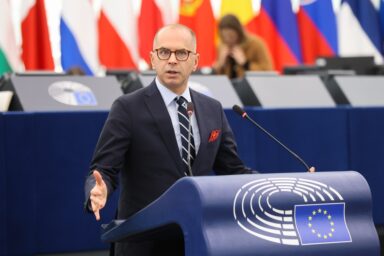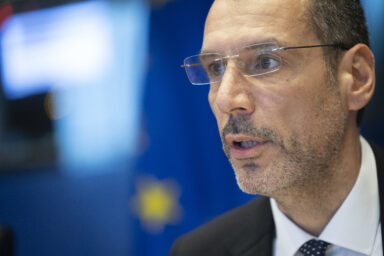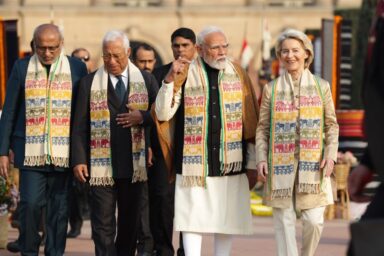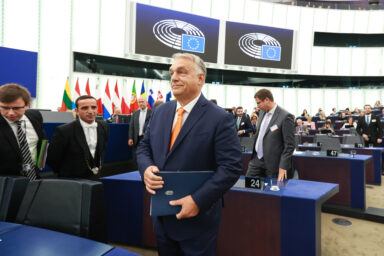The European Parliament’s Civil Liberties Committee (LIBE) met on 11 November to debate a draft report on the EU Return Regulation, a key part of the Commission’s migration agenda. MEP Malik Azmani, known for a measured, rights-sensitive approach compared with the Commission’s initial tougher proposal, presented Parliament’s response, emphasising the balance between effective returns and the protection of fundamental rights.
Back in March, the Commission first proposed overhauling the EU’s return system, including the creation of “return hubs” in third countries to temporarily host migrants before repatriation to their countries of origin. In his address on Tuesday, MEP Azmani acknowledged the Commission’s proposal as an important starting point for addressing gaps in the existing framework and tackling illegal migration across the 27-member bloc, while noting that earlier attempts to reform existing legislation had not been successful in Parliament. He said the situation was no longer tenable, with an outdated legal framework from 2008 leading not only to a low rate of returns but also to eligible asylum seekers being overlooked and “left out in the cold”, eroding trust in the European migration system.
The world changed and our own Union is not the same. – Rapporteur Malik Azmani, (Renew/NED)
“The world changed and our own Union is not the same,” he stressed — now it was the EU itself that had “to adapt to the new situation.”
A ‘balanced’ return framework
Mr Azmani thanked the Commission and Commissioner Brunner for the proposal and said it “marked the start of an effective response”. But he made clear that, as rapporteur, he saw areas for improvement. He then explained, point by point, his draft position.
“I tried to create an effective and sustainable return system in a balanced approach, enforceable and with human dignity.”
To achieve this balance, he said, he thoroughly informed himself by engaging with representatives from nearly all member states, as well as NGOs, EU agencies, and other stakeholders. His process included field visits — notably to authorities in France and the Netherlands, and to a return hub in Albania. He also held technical meetings with shadow MEPs and other participants to discuss and refine the draft.
You might be interested
Harmonisation and a stronger role for Frontex
Point number one, he declared, was harmonisation: EU members working closely together and sharing data through the existing Schengen Information System.
“It is not a surprise that I am aiming for a more European approach (…) that is why I propose a direct mandatory mutual recognition between member states,” which he said would reduce the administrative burden. He explained that he had also created a greater role for Frontex in return procedures.
Second, he welcomed the readmission procedure introduced by the Commission but said it had explicitly missed an important point: ensuring agreement and cooperation from third countries.

Voluntary over forced return
Third, Mr Azmani said he prioritised voluntary as opposed to forced return.
“It’s clear to me after my own experience in the migration field, talking with people on the ground (…) that voluntary return is more sustainable, effective and efficient.”
To intensify interest in voluntary return, he proposed that it should not be possible to enforce an entry ban except in the case of security threats. Still, he said, forced return had a place.
Fourth, he said it was necessary to create long-term cooperation with third countries.
Rights, safeguards and security
Fifth, he made clear that fundamental rights formed the backbone of his draft. He stressed that it was of utmost importance not to forget that the EU was dealing with people, who must be sufficiently informed about their rights.
Sixth, he made clear he saw detention as a matter of last resort, although still necessary.
Seventh, he underlined that safety within the borders was key.
It’s clear to me after my own experience in the migration field, talking with people on the ground (…) that voluntary return is more sustainable, effective and efficient. – Rapporteur Malik Azmani, (Renew/NED)
He went on with additional points, but the gist was clear: Mr Azmani’s draft is more moderate than certain aspects of the Commission’s approach. It emphasises voluntary returns, limits the use of detention in line with existing safeguards, and strengthens protections for vulnerable groups, including minors and families. The draft also calls for greater transparency and oversight, urging member states to inform the European Parliament when they implement return hubs and recommending that the EU — potentially through Frontex — take a more active role in coordinating and harmonising the monitoring and reporting of return procedures.
Debate and political divide
After his presentation, shadow rapporteurs expressed that they shared his sense of responsibility and could collaborate on the asylum and migration system. There were some points of disagreement, including the idea of voluntary returns, with some stressing that only a tough approach first would make voluntary return preferable or more palatable.
While the draft adds a less harsh sheen to the Commission’s original plan, it remains unclear whether all MEPs — especially from right-leaning and far-right groups — will consider it strict, efficient or robust enough. Some made clear from the outset they would not. As an example, MEP Marieke Ehlers (ID/NED) said she saw very little in the proposal that would actually “accelerate” the return of illegal migrants. Then again, in the Netherlands, her party is infamous for its anti-migration and Eurosceptic stance, while grouping with Marine Le Pen’s National Rally, Matteo Salvini’s Lega, and AfD in the European Parliament. The contrast between her critique and the measured, balanced approach of the rapporteur could not be more striking.
A number of MEPs, even those welcoming the draft, said they needed more time to thoroughly assess its contents.











